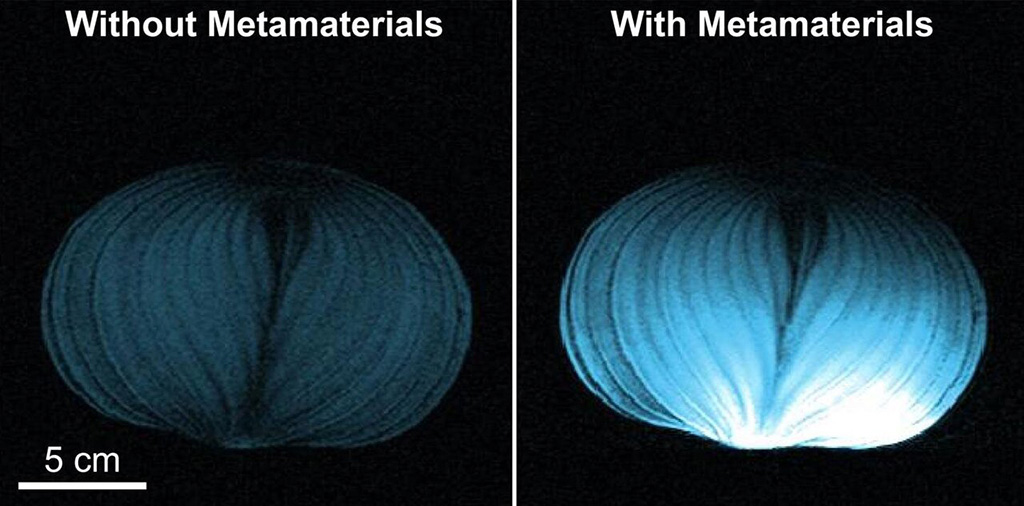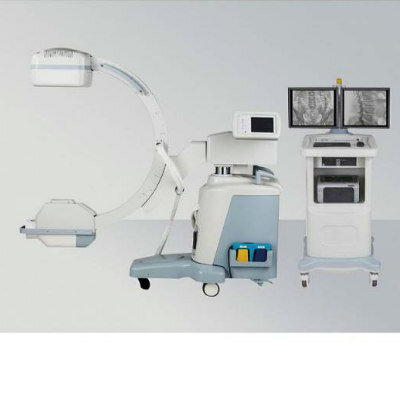Nonlinear Metamaterials Could Revolutionize MRI Scanning
|
By MedImaging International staff writers Posted on 20 Nov 2019 |

Image: Intelligent metamaterials Enhance MRI images (Photo courtesy of BU)
A new intelligent metamaterial could make the entire magnetic resonance imaging (MRI) process faster, safer, and more accessible to patients.
Developed by researchers at Boston University (BU; MA, USA), the coupled nonlinear metamaterial (NLMM) features a self‐adaptive response that amplifies the magnetic field commiserate to the resonance of the radio‐frequency (RF) excitation strength. The NLMM is suppressed in response to higher degrees of RF and recovers during a low excitation strength phase, thus increasing the signal-to-noise ratio (SNR) 10-fold, greatly enhancing image quality and reducing scan time, and thus opening up a new way to obtain crisper MRI images at very low cost.
The nonlinear response of the NLMM behavior is passive, selectively boosting low-energy RF emissions from the patient's body in normal mode, and turning itself off during the millisecond bursts of high-energy RF transmission from the MRI machine. The off-time, which last just a few milliseconds, allows intelligent NLMM to enhance the energy sent back to the MRI. It also diminishes the patient's overall exposure to radio wave radiation and mitigates potential safety concerns. The study was published on October 30, 2019, in Advanced Materials.
“The intelligent metamaterial consists of an array of metallic helical resonators closely packed with a passive sensor,” said lead author professor of radiology Xiaoguang Zhao, MD. “When the high-energy radio waves are coming in, the metamaterial detects the high energy level and turns off the resonance automatically. With low-energy radio excitation, the metamaterial turns on the resonance and enhances the magnetic component of the radio wave. We can now build smart materials that can interact with radio waves intelligently, enhancing the wanted signal while letting the unwanted signal go.”
MRI represents a powerful diagnostic tool in the armamentarium of modern healthcare that is widely applied across a spectrum of diseases, from stroke to cancer imaging and beyond. It can be used to generate images from a range of tissue properties without ionizing radiation, resulting in an inherently high degree of tissue contrast. Chief among the performance metrics of MRI systems is SNR, which may be leveraged to boost overall acquisition performance, from image resolution to the efficiency of image acquisition, and has been demonstrated to improve anatomic delineation and detection of pathology.
Related Links:
Boston University
Developed by researchers at Boston University (BU; MA, USA), the coupled nonlinear metamaterial (NLMM) features a self‐adaptive response that amplifies the magnetic field commiserate to the resonance of the radio‐frequency (RF) excitation strength. The NLMM is suppressed in response to higher degrees of RF and recovers during a low excitation strength phase, thus increasing the signal-to-noise ratio (SNR) 10-fold, greatly enhancing image quality and reducing scan time, and thus opening up a new way to obtain crisper MRI images at very low cost.
The nonlinear response of the NLMM behavior is passive, selectively boosting low-energy RF emissions from the patient's body in normal mode, and turning itself off during the millisecond bursts of high-energy RF transmission from the MRI machine. The off-time, which last just a few milliseconds, allows intelligent NLMM to enhance the energy sent back to the MRI. It also diminishes the patient's overall exposure to radio wave radiation and mitigates potential safety concerns. The study was published on October 30, 2019, in Advanced Materials.
“The intelligent metamaterial consists of an array of metallic helical resonators closely packed with a passive sensor,” said lead author professor of radiology Xiaoguang Zhao, MD. “When the high-energy radio waves are coming in, the metamaterial detects the high energy level and turns off the resonance automatically. With low-energy radio excitation, the metamaterial turns on the resonance and enhances the magnetic component of the radio wave. We can now build smart materials that can interact with radio waves intelligently, enhancing the wanted signal while letting the unwanted signal go.”
MRI represents a powerful diagnostic tool in the armamentarium of modern healthcare that is widely applied across a spectrum of diseases, from stroke to cancer imaging and beyond. It can be used to generate images from a range of tissue properties without ionizing radiation, resulting in an inherently high degree of tissue contrast. Chief among the performance metrics of MRI systems is SNR, which may be leveraged to boost overall acquisition performance, from image resolution to the efficiency of image acquisition, and has been demonstrated to improve anatomic delineation and detection of pathology.
Related Links:
Boston University
Latest MRI News
- World's First Sensor Detects Errors in MRI Scans Using Laser Light and Gas
- Diamond Dust Could Offer New Contrast Agent Option for Future MRI Scans
- Combining MRI with PSA Testing Improves Clinical Outcomes for Prostate Cancer Patients
- PET/MRI Improves Diagnostic Accuracy for Prostate Cancer Patients
- Next Generation MR-Guided Focused Ultrasound Ushers In Future of Incisionless Neurosurgery
- Two-Part MRI Scan Detects Prostate Cancer More Quickly without Compromising Diagnostic Quality
- World’s Most Powerful MRI Machine Images Living Brain with Unrivaled Clarity
- New Whole-Body Imaging Technology Makes It Possible to View Inflammation on MRI Scan
- Combining Prostate MRI with Blood Test Can Avoid Unnecessary Prostate Biopsies
- New Treatment Combines MRI and Ultrasound to Control Prostate Cancer without Serious Side Effects
- MRI Improves Diagnosis and Treatment of Prostate Cancer
- Combined PET-MRI Scan Improves Treatment for Early Breast Cancer Patients
- 4D MRI Could Improve Clinical Assessment of Heart Blood Flow Abnormalities
- MRI-Guided Focused Ultrasound Therapy Shows Promise in Treating Prostate Cancer
- AI-Based MRI Tool Outperforms Current Brain Tumor Diagnosis Methods
- DW-MRI Lights up Small Ovarian Lesions like Light Bulbs
Channels
Radiography
view channel
Novel Breast Imaging System Proves As Effective As Mammography
Breast cancer remains the most frequently diagnosed cancer among women. It is projected that one in eight women will be diagnosed with breast cancer during her lifetime, and one in 42 women who turn 50... Read more
AI Assistance Improves Breast-Cancer Screening by Reducing False Positives
Radiologists typically detect one case of cancer for every 200 mammograms reviewed. However, these evaluations often result in false positives, leading to unnecessary patient recalls for additional testing,... Read moreUltrasound
view channel
Largest Model Trained On Echocardiography Images Assesses Heart Structure and Function
Foundation models represent an exciting frontier in generative artificial intelligence (AI), yet many lack the specialized medical data needed to make them applicable in healthcare settings.... Read more.jpg)
Groundbreaking Technology Enables Precise, Automatic Measurement of Peripheral Blood Vessels
The current standard of care of using angiographic information is often inadequate for accurately assessing vessel size in the estimated 20 million people in the U.S. who suffer from peripheral vascular disease.... Read more
Deep Learning Advances Super-Resolution Ultrasound Imaging
Ultrasound localization microscopy (ULM) is an advanced imaging technique that offers high-resolution visualization of microvascular structures. It employs microbubbles, FDA-approved contrast agents, injected... Read more
Novel Ultrasound-Launched Targeted Nanoparticle Eliminates Biofilm and Bacterial Infection
Biofilms, formed by bacteria aggregating into dense communities for protection against harsh environmental conditions, are a significant contributor to various infectious diseases. Biofilms frequently... Read moreNuclear Medicine
view channel
New Imaging Technique Monitors Inflammation Disorders without Radiation Exposure
Imaging inflammation using traditional radiological techniques presents significant challenges, including radiation exposure, poor image quality, high costs, and invasive procedures. Now, new contrast... Read more
New SPECT/CT Technique Could Change Imaging Practices and Increase Patient Access
The development of lead-212 (212Pb)-PSMA–based targeted alpha therapy (TAT) is garnering significant interest in treating patients with metastatic castration-resistant prostate cancer. The imaging of 212Pb,... Read moreNew Radiotheranostic System Detects and Treats Ovarian Cancer Noninvasively
Ovarian cancer is the most lethal gynecological cancer, with less than a 30% five-year survival rate for those diagnosed in late stages. Despite surgery and platinum-based chemotherapy being the standard... Read more
AI System Automatically and Reliably Detects Cardiac Amyloidosis Using Scintigraphy Imaging
Cardiac amyloidosis, a condition characterized by the buildup of abnormal protein deposits (amyloids) in the heart muscle, severely affects heart function and can lead to heart failure or death without... Read moreGeneral/Advanced Imaging
view channel
PET Scans Reveal Hidden Inflammation in Multiple Sclerosis Patients
A key challenge for clinicians treating patients with multiple sclerosis (MS) is that after a certain amount of time, they continue to worsen even though their MRIs show no change. A new study has now... Read more
Artificial Intelligence Evaluates Cardiovascular Risk from CT Scans
Chest computed tomography (CT) is a common diagnostic tool, with approximately 15 million scans conducted each year in the United States, though many are underutilized or not fully explored.... Read more
New AI Method Captures Uncertainty in Medical Images
In the field of biomedicine, segmentation is the process of annotating pixels from an important structure in medical images, such as organs or cells. Artificial Intelligence (AI) models are utilized to... Read more.jpg)
CT Coronary Angiography Reduces Need for Invasive Tests to Diagnose Coronary Artery Disease
Coronary artery disease (CAD), one of the leading causes of death worldwide, involves the narrowing of coronary arteries due to atherosclerosis, resulting in insufficient blood flow to the heart muscle.... Read moreImaging IT
view channel
New Google Cloud Medical Imaging Suite Makes Imaging Healthcare Data More Accessible
Medical imaging is a critical tool used to diagnose patients, and there are billions of medical images scanned globally each year. Imaging data accounts for about 90% of all healthcare data1 and, until... Read more
Global AI in Medical Diagnostics Market to Be Driven by Demand for Image Recognition in Radiology
The global artificial intelligence (AI) in medical diagnostics market is expanding with early disease detection being one of its key applications and image recognition becoming a compelling consumer proposition... Read moreIndustry News
view channel
Bayer and Google Partner on New AI Product for Radiologists
Medical imaging data comprises around 90% of all healthcare data, and it is a highly complex and rich clinical data modality and serves as a vital tool for diagnosing patients. Each year, billions of medical... Read more

















